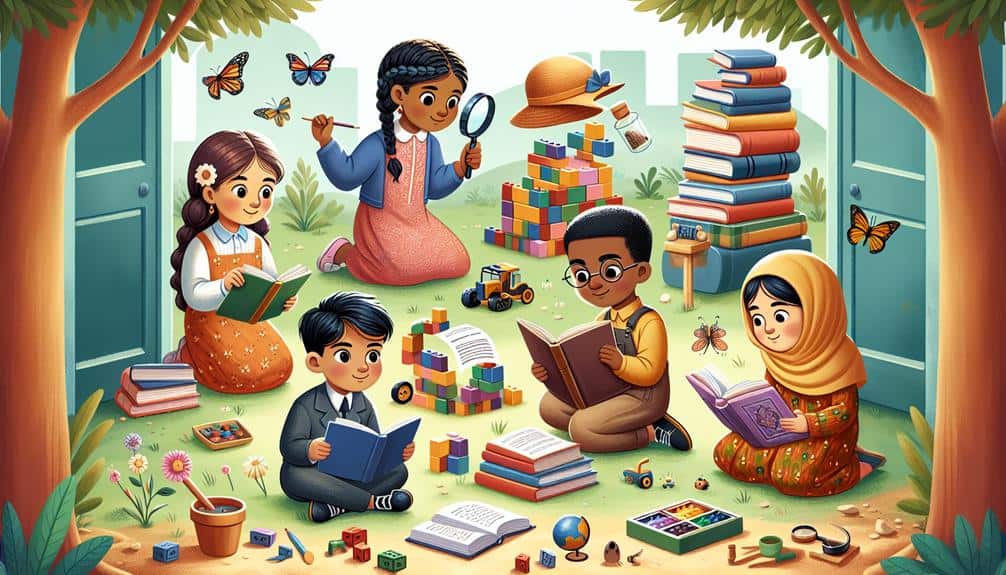Unschooling champions self-directed learning, valuing personal interests over standard curriculum. It nurtures critical thinking and self-confidence by tailoring education to individual needs. Parents play an essential role, supporting children's curiosity and providing resources for exploration. This method encourages intrinsic motivation, empowering learners to control their educational journey. Implementing unschooling at home demands a blend of structure and flexibility, adapting to each child's unique learning style. By prioritizing autonomy and passion, unschooling challenges traditional educational norms. Discover more about this innovative philosophy and its principles to explore further into its impact on learning and development.
Key Points
- Unschooling emphasizes self-directed learning and autonomy.
- It values individual interests and natural curiosity.
- Challenges misconceptions about traditional education effectiveness.
- Offers benefits like critical thinking and self-confidence.
- Tailors education to individual needs and passions.
Defining Unschooling Philosophy
Unschooling philosophy is an educational approach that emphasizes self-directed learning and autonomy over traditional curriculum and standardized testing. Despite the common misconceptions, unschooling doesn't mean an absence of learning or unstructured education. Rather, it's a method that allows individuals to pursue their interests and passions, guiding their own educational journey.
One of the benefits of unschooling is the opportunity for students to develop a deep sense of intrinsic motivation. By following their interests, learners are more engaged and enthusiastic about learning, leading to a more profound understanding of subjects.
Additionally, unschooling fosters creativity and critical thinking skills as individuals are encouraged to explore topics in a way that resonates with them personally.
It is essential to recognize that unschooling isn't a one-size-fits-all approach and may not suit every learner. However, understanding the true essence of unschooling can help dispel misconceptions and highlight the valuable benefits it can offer to those who thrive in a self-directed learning environment.
Core Principles of Unschooling
The core principles of unschooling emphasize individualized learning experiences and self-directed exploration rather than adherence to a predetermined curriculum. This educational approach values the natural curiosity and interests of each child, fostering a love for learning that extends beyond traditional classroom boundaries.
Here are some key aspects to take into account:
- Unschooling misconceptions: Many misconceptions surround unschooling, with critics often questioning the effectiveness of a system without formal structure. However, unschooling promotes a deep understanding of subjects through real-world experiences and self-motivated discovery, challenging the idea that traditional schooling is the only path to knowledge.
- Benefits of unschooling: Unschooling offers numerous benefits, including the development of critical thinking skills, increased self-confidence, and a passion for lifelong learning. By allowing children to pursue their interests freely, unschooling nurtures creativity and independence, preparing them for success in an ever-changing world.
- Personalized learning: Unschooling recognizes that each child is unique and learns at their own pace. By tailoring education to individual needs and interests, unschooling creates a dynamic and engaging learning environment that fosters a deep love for acquiring knowledge.
Self-Directed Learning in Unschooling
Self-directed learning in this educational approach empowers individuals to take control of their own educational journey, fostering autonomy and a deep sense of responsibility for one's learning.
Student autonomy lies at the heart of unschooling, where individuals are encouraged to follow their interests, passions, and curiosities. This method nurtures a sense of independence and self-motivated learning, as learners are free to choose what, how, and when they want to study.
In unschooling, student autonomy means that individuals have the freedom to explore various subjects based on their preferences and learning styles. This approach emphasizes intrinsic motivation, where individuals engage in learning driven by their internal desires rather than external rewards or pressures.
Role of Parents in Unschooling
Parents play a significant role in supporting and facilitating the self-directed learning process within unschooling environments. Parental support is essential for unschooling to be successful as it involves creating an environment where children can explore their interests freely.
Here's how parents can effectively support unschooling:
- Encouraging Curiosity: By fostering a sense of wonder and curiosity in your child, you can ignite their passion for learning. Encourage them to ask questions and seek answers independently.
- Providing Resources: Offer access to a variety of resources such as books, online materials, and field trips to aid their exploration. By ensuring a rich learning environment, parents can enhance their child's unschooling experience.
- Building Trust: Trusting children to direct their learning allows them to develop independence and self-reliance. Parents who trust their children's innate desire to learn empower them to take ownership of their education.
Implementing Unschooling at Home
Successfully implementing unschooling at home requires a structured yet flexible approach that adapts to your child's individual learning needs and interests. Unschooling challenges traditional educational norms by emphasizing self-directed learning and exploration. To navigate these challenges effectively, it's essential to create a supportive environment that fosters curiosity and critical thinking.
One key aspect of implementing unschooling is to leverage unschooling resources that align with your child's passions and curiosities. These resources can include online courses, educational materials, community programs, and hands-on experiences. By utilizing a diverse range of resources, you can cater to your child's unique learning style and interests.
Moreover, establishing a daily routine that allows for spontaneity and exploration while also incorporating essential subjects like math, science, and language arts can help strike a balance between structure and freedom.
Frequently Asked Questions
Can Unschooling Work for Children With Special Needs?
Unschooling can be effective for children with special needs when tailored to their individualized approach. Utilizing support systems and adapting the curriculum can provide a nurturing environment for growth and development that meets their unique requirements.
How Do Unschooled Students Transition to Higher Education?
Moving to higher education from unschooling involves proving college readiness. Unconventional learning methods can nurture critical thinking, self-motivation, and adaptability, valuable skills for academic success. Adjusting to structured environments may require additional support and guidance.
Is There a Recommended Curriculum for Unschooling?
In unschooling, there isn't a one-size-fits-all curriculum. The approach emphasizes flexibility and creativity, tailoring learning to your interests and strengths. By embracing an individualized approach, unschooling nurtures a love for learning that goes beyond traditional constraints.
What Socialization Opportunities Are Available for Unschooled Children?
You can provide socialization opportunities for unschooled children through community involvement in local groups, sports teams, and clubs. Extracurricular activities like music lessons or volunteering also offer chances to interact with peers and develop social skills.
How Do Unschooling Parents Balance Work and Facilitating Learning?
Balancing work and facilitating your child's learning in unschooling involves setting clear boundaries, prioritizing tasks, and utilizing time management techniques. Incorporating real-world experiences and child-led exploration can enrich the learning process.



